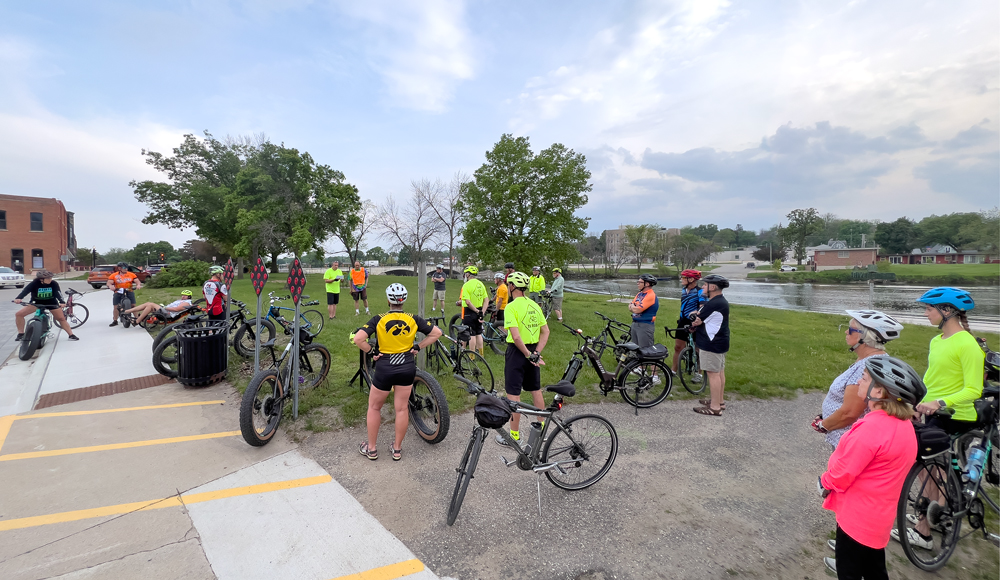North Dakota denies Summit Carbon a pipeline permit

By Jared Strong, Iowa Capital Dispatch
Summit Carbon Solutions has failed to minimize the negative impacts of its proposed carbon dioxide pipeline in North Dakota and will not be permitted to construct it, state regulators decided on Friday.
The state is a key part of the company’s $5 billion project, which would span more than 2,000 miles in five states, including Iowa through Floyd County. The company’s plan is to transport captured carbon dioxide from ethanol plants to North Dakota for underground sequestration.
That state’s three-person Public Service Commission unanimously denied the company a route permit.
“The commission finds that (Summit Carbon Solutions) has not provided sufficient evidence to demonstrate that the location, construction, operation and maintenance of the project will produce minimum adverse impacts upon the welfare of the citizens of North Dakota,” the commission wrote in its Friday order.
Summit can appeal the decision in state court but indicated on Friday that it will file a new application with a revised proposal.
“We’re committed to understanding and incorporating the considerations outlined in the decision,” said Sabrina Zenor, a Summit spokesperson. “We are confident that our project supports state policies designed to boost key economic sectors: agriculture, ethanol, and energy.”
Zenor did not say when that new application would be submitted. The application that was denied was submitted in October 2022, and the process took about 10 months, according to state records.
Summit has indicated it wants to start construction on the pipeline in Iowa next year. The company’s final evidentiary hearing for its permit in Iowa is poised to begin later this month. About 700 miles of the pipeline route is in Iowa.
Opposing viewpoints
The project is meant to capitalize on generous federal tax incentives that reward the ethanol plants for sequestering carbon dioxide they would otherwise emit into the atmosphere or for producing low-carbon fuels. It would also allow the plants to sell their ethanol in low-carbon-fuel markets at potentially higher prices.
A study commissioned by the Iowa Renewable Fuels Association — a lobbying group that supports Summit’s proposal — concluded that ethanol plants could more than triple their profits by connecting to a pipeline like Summit’s. There are two other carbon dioxide pipeline proposals that are pending in Iowa, including one, Navigator CO2 Ventures, that would also go into Floyd County.
Federal officials have said the pipelines are necessary for helping the country achieve its goals of reducing greenhouse gas emissions, but opponents of the projects say they will prolong the use of fossil fuels and delay a transition to electric vehicles that can be powered by wind and solar energy.
There is also growing public outcry over property rights of landowners in the path of the projects. A substantial portion of Summit’s route in Iowa — more than a quarter of it — might require the use of eminent domain to obtain forced easements for the pipeline.
The company said recently about 950 parcels of land in Iowa might be subject to eminent domain at its Iowa Utilities Board hearing that starts Aug. 22. That hearing could go on for weeks or months. Floyd County, along with other Iowa counties, has been accepted to be an intervenor in that process, meaning it can present evidence and question witnesses.
State lawmakers failed this year to adopt new protections for landowners who have refused to sign voluntary easements with the pipeline companies, but some of those lawmakers have sought to participate in Summit’s hearing and worry that its permit process has been rushed.
North Dakota deficiencies
About 320 miles of Summit’s route is planned for North Dakota. Its end point is northwest of Bismarck, where CO2 would be pumped deep into the ground.
But the North Dakota commissioners found that Summit’s proposal doesn’t minimize its impact on the environment and residents or didn’t have sufficient proof that it does.
Among the deficiencies the commissioners noted were:
• Summit did not fully allay the concerns of the State Historical Society of North Dakota about its route’s effects on cultural sites.
• The pipeline’s effects on property values was not thoroughly shown to be minimized.
• Summit did not show it had fully considered alternative routes to avoid public wildlife areas and to address “legitimate impacts expressed by landowners.”
• The company did not address how it would build and operate its pipeline in more than a dozen areas that have potential geologic instability.
The commission noted that its decision did not hinge on eminent domain or safety concerns, which it deemed outside of its purview.
Pipeline opponents said the commission’s decision is a significant win for them.
“I think it’s precedent setting,” said Jess Mazour, of the Sierra Club of Iowa. “It shows us that organized people who are willing to work together for a common cause can beat big money, like Summit’s pipeline. … It also shows us that Iowa needs to slow down.”
Summit’s project was initially estimated to cost about $4.5 billion, but the company’s chief operating officer testified to the North Dakota commissioners that it would be about $5.5 billion. Summit has paid hundreds of millions of dollars to landowners up front for easements and will not recoup that money if the pipeline isn’t built.
“We applaud the Public Service Commission for their courage and thoughtfulness in denying Summit’s application and encourage the other states to follow suit,” said Brian Jorde, an Omaha, Nebraska, attorney who represents dozens of landowners in several states including in Floyd County who oppose the pipeline projects.
— Iowa Capital Dispatch is part of States Newsroom, a network of news bureaus supported by grants and a coalition of donors as a 501c(3) public charity. Iowa Capital Dispatch maintains editorial independence. Contact Editor Kathie Obradovich for questions: info@iowacapitaldispatch.com. Follow Iowa Capital Dispatch on Facebook and Twitter.









Social Share